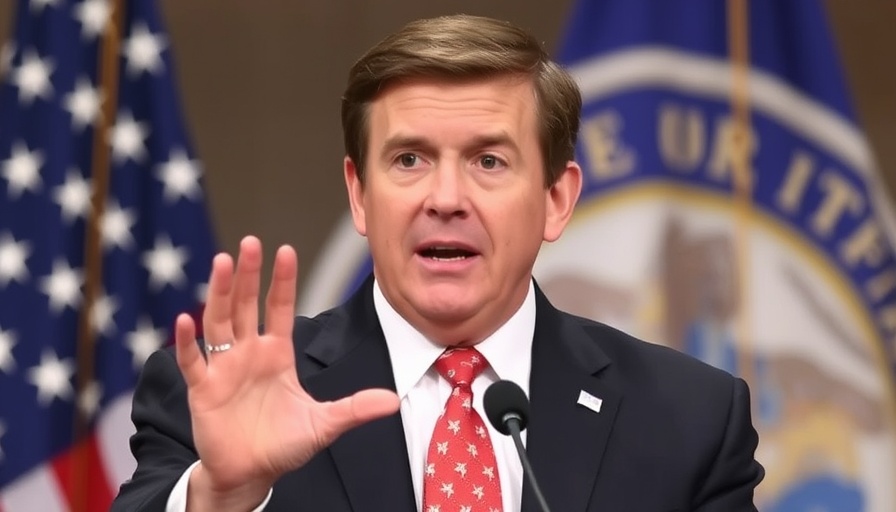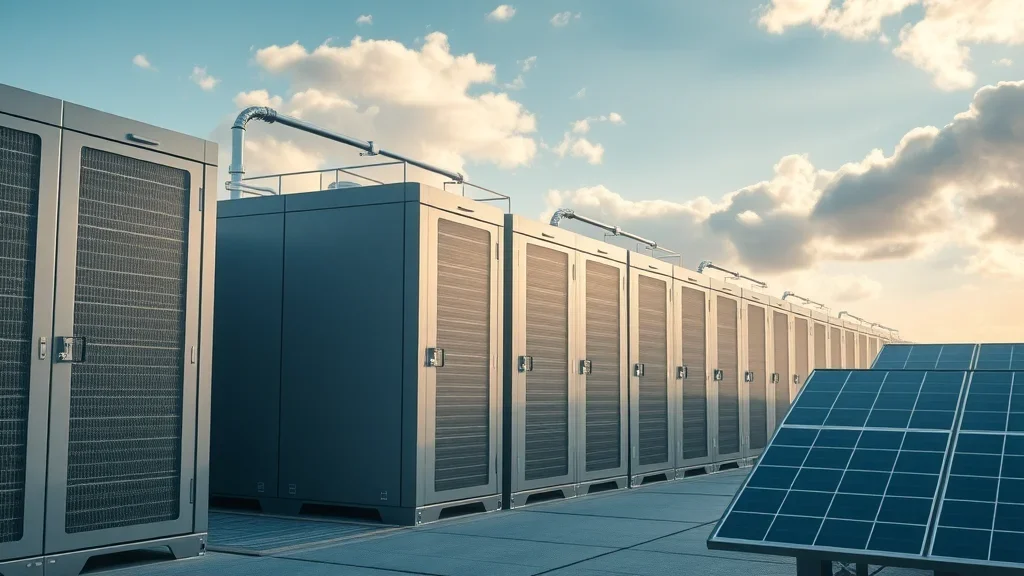Did you know: The world’s largest AI data centers now draw more electricity than entire mid-sized cities—driving a race to build new facilities faster than ever before. As artificial intelligence explodes in use, the places these data centers call home are changing fast and in unexpected ways.An Unconventional Surge: AI Data Center Locations Driving a New Infrastructure BoomThe selection of AI data center locations has become one of the most urgent and competitive infrastructure races of the decade. Just a decade ago, data centers were hidden away in generic business parks. Today, thanks to the exponentially growing hunger for AI-powered computing, these sites now shape whole regional economies. The United States, Europe, and rapidly advancing hubs in Asia are witnessing an unprecedented concentration of high-tech investment as companies vie to support the relentless growth of AI data and machine learning workloads.This unconventional surge is driven by factors from technological demand to real estate availability, and even political incentives. The data center market is no longer only about space—it’s about proximity to large power grids, renewable resources, and lightning-fast fiber links. The result? Entire regions are being transformed into energy and innovation hubs. In the process, these new clusters of AI-driven data centers are shaping the physical and economic landscape of our digital future.What You’ll Learn About AI Data Center LocationsHow AI data center locations are chosen and why location mattersMajor trends shaping the data center marketThe role of new technologies in influencing AI data center growthProfiles of emerging hotspots for data centers in the United States and abroadFuture outlook for AI data center locations and potential opportunitiesUnderstanding the Basics: What Are AI Data Centers and Why Location MattersAI data centers are specialized facilities designed to power, process, and store the vast quantities of data that artificial intelligence models require. Unlike traditional data centers, which may handle a mix of cloud, storage, and connectivity workloads, AI data centers harness accelerators like GPUs and custom computer chips to meet the intense computing demands of modern AI algorithms.The location of these centers is crucial. They must be close to powerful energy sources, offer low-latency network connections, and provide a secure, climate-controlled environment for sensitive equipment. Site selection requires careful consideration of local power grids, natural resources, and even tax breaks or regulatory factors, all of which can impact operational efficiency and cost. In the competitive data center industry, location isn’t just about geography—it’s about gaining a strategic edge in speed, sustainability, and scale.“Just as the railroad defined the 19th century, AI data center locations will define the digital landscape of the 21st.” – Tech Industry AnalystKey Drivers Behind AI Data Center Locations Moving FastExponential growth in AI workloadsIncreasing energy requirements and sustainability challengesShifting global supply chainsEmergence of new data center market dynamicsAI workloads have grown at a breakneck pace—driven by advancements in artificial intelligence, the proliferation of smart devices, and enterprises’ need for real-time analytics. This surging demand puts pressure on the physical infrastructure supporting AI, spurring the rapid selection and development of new ai data center locations. Operators are forced to find locations that offer access to massive power grids, renewable energy integration, and incentives like tax breaks—all while keeping operations near users for faster data processing.Other influential factors include stability of the energy supply (especially in regions facing power shortages), proximity to major network nodes, and even the resilience of the location to risks like natural disasters. In addition, global supply chains for critical data center equipment such as computer chips, cooling systems, and backup generators are impacting where—and how quickly—new AI data centers can be built. The combined effect is a transformation in how industry leaders approach site selection, blending advanced technology with old-fashioned logistics and risk management.Political and regulatory actions can also play a pivotal role in shaping the future of large-scale infrastructure projects, including data centers. For example, shifts in government policy have had significant impacts on other energy-intensive sectors—such as the offshore wind industry—demonstrating how external factors can threaten or accelerate job growth and investment. To see how political decisions have influenced renewable energy jobs, explore the impacts of political actions on offshore wind jobs in America.The AI Data Center Market: Global and Regional TrendsThe data center market is evolving, with regional hubs emerging based on local strengths. In North America, mega-scale campuses in the United States and Canada attract cloud giants and AI startups alike thanks to abundant land, incentives, and robust infrastructure. Across Europe, sustainability goals are driving investment in Nordic countries—tapping renewable energy and cooling advantages. Meanwhile, APAC countries such as Singapore and South Korea attract investment with advanced connectivity and policy support, despite space and power constraints.Globally, these trends mean that traditional data center locations are being joined by a new generation of specialist ai data center hubs. This shift is rebalancing not only the center market but global innovation and investment flows. The complexity of choosing where to build has never been higher, but so are the opportunities for regions that get it right.Top AI Data Center Locations by Investment, Power Capacity, and Cloud Provider Presence (2024)RegionLeading City/HubInvestment ($B)Power Capacity (GW)Major Cloud ProvidersUSANorthern Virginia143.5Amazon, Microsoft, GoogleUSASilicon Valley71.1Meta, Oracle, GoogleEuropeLondon50.9Microsoft, AWS, EquinixAsia-PacificSingapore61.0Alibaba, Google, Digital RealtyCanadaMontreal30.7Amazon, MicrosoftMapping AI Data Center Locations in the United StatesThe United States is undergoing a transformation as new and existing ai data center locations cluster in key regions. Traditionally, facilities centered around major metropolitan areas with access to talent and robust infrastructure. Today, the landscape is shifting rapidly, as operators consider everything from renewable energy potential to seismic risk, water availability, and even proximity to the world’s largest fiber exchanges.Northern Virginia remains the “data capital of the world,” but rapid expansion is now seen in Texas, the Pacific Northwest, and even the Midwest. New infrastructure is being built to keep up with the surge in demand, often in places with unique advantages—whether abundant land, low energy costs, or attractive government incentives. These shifting trends are reshaping where digital traffic flows, creating new tech corridors and economic opportunities across the country.Northern Virginia: The Epicenter of AI Data Centers in the United StatesNo region embodies the explosive growth quite like Northern Virginia. This area now houses the largest concentration of ai data centers in the world, powering everything from streaming services to high-stakes financial trades. Why Northern Virginia? The answer lies in a unique mix: decades-old telecom infrastructure, proximity to federal power grids, strong tax incentives, and a business-friendly environment have made it irresistible to major players like Amazon Web Services, Microsoft, and Google.Local governments have encouraged this boom with aggressive policy support, while vast tracts of real estate allow for sprawling data center campuses that scale up quickly—as seen with the recent 300,000+ square foot expansions in Ashburn. With regional energy companies and the Salt River Project ramping up, Northern Virginia is likely to remain the global center for digital realty for years to come, despite growing concerns about the toll on the power grid and gallons of water needed for cooling.Silicon Valley and Other West Coast Data Center HotspotsThe Silicon Valley region remains at the heart of American tech, and its data center footprint is expanding as AI and edge computing push workloads ever closer to innovation’s front lines. The attraction of Silicon Valley lies in its aggregation of high-skilled talent, proximity to the headquarters of leading AI research companies, and established high-speed network links. However, the surge in demand is pushing up against expensive real estate, energy constraints, and tough sustainability mandates from local governments.It’s not just California: Seattle, Portland, and the Phoenix area have emerged as strong alternatives. These areas offer comparable connectivity, lower costs, and access to renewable energy—a major draw for operators seeking to reduce the carbon footprint of their AI data operations. Meanwhile, organizations like Digital Realty and Equinix have invested heavily in these regions, recognizing how critical West Coast hubs are to the global data center market.Emerging AI Data Center Locations Across North AmericaTexas and renewable energy integration: Texas is quickly climbing the ranks thanks to cheap land, massive renewable energy projects (especially wind and solar), and pro-business tax breaks. Its strong connection to major power grids has attracted several hyperscale data center deployments in recent years.The Midwest: balancing cost and climate: Illinois, Iowa, and Nebraska are gaining popularity due to their affordable land, low cooling costs, and central position on cross-country networks. Climate-controlled environments and access to the nation’s vast natural gas network help reduce risks and energy spending.Canada’s incentive-driven approach: Cities like Montreal leverage abundant hydropower, cold climate, and aggressive government programs—driving rapid growth in ai data center investment focused on sustainability and cost efficiency.These locations highlight how the data center market in North America is evolving to balance innovation with practical considerations: available energy, climate, and local incentives are key determinants that shape the competitive dynamics of the sector.Leading Global AI Data Center Locations and OperatorsGlobally, the largest data center operators—like Digital Realty and Equinix—are driving the shift toward higher-density, more efficient AI data facilities. London, Singapore, Frankfurt, and Stockholm now compete for top billing alongside U. S. hubs, as cloud and AI deployments escalate worldwide. The reach and influence of these mega operators stretch from campus-sized investments in the U. S. to new cloud “availability zones” in fast-growing fintech and IoT markets abroad.Smaller but highly specialized operators are also carving out strongholds, especially in emerging markets. The common thread is their focus on cutting-edge infrastructure, access to immense power grids, and positioning in economically or geopolitically favorable sites. As these global trends accelerate, the list of must-watch ai data center geographies grows longer by the year.Digital Realty, Equinix, and Other Influential Data Center OperatorsDigital Realty and Equinix are the titans of the data center operator world, with presence in major cities like London, Singapore, New York, and San Francisco. Their reach is marked by a blend of cutting-edge facility design, vast campus networks, and a relentless focus on uptime and security—a necessity for today’s AI-driven demands. Their ability to quickly establish new sites in global tech hubs keeps them ahead in the competitive data center market.New challengers like Cologix, Switch, and Iron Mountain are making waves with highly secure, energy-efficient sites and innovative approaches to cooling, security, and renewable integration. The influence of these global center operators in shaping not just where—but how—data is processed worldwide is undeniable.Critical Factors Influencing the Choice of AI Data Center LocationsPower availability and costAccess to renewable resourcesTax incentives and regulatory factorsLatency and network proximityRisk mitigation: disaster resilience and securityWhen deciding on ai data center locations, operators weigh a complex matrix of factors. Reliable and affordable power is paramount—a single data center may require hundreds of megawatts, pushing local power grids to the limit. Access to renewable energy, such as wind, solar, or hydropower, is increasingly non-negotiable due to both regulatory pressure and corporate sustainability goals.Tax incentives, real estate costs, and regulatory support can tip the scales between similar sites. Latency—proximity to major network nodes and population centers—remains critical, especially for real-time AI applications. Risk management also plays a role: operators avoid high-risk areas for earthquakes, flooding, and wildfires while seeking to maintain robust physical and cyber security. Each element shapes the ultimate success and resilience of AI data operations.The Role of Sustainability in Modern AI Data CentersSustainability is now a core consideration in new ai data center locations. With environmental regulations tightening worldwide and public scrutiny intensifying, operators are aggressively pursuing green strategies—integrating solar panels, on-site wind turbines, advanced cooling systems that use less gallons of water, and smart grid technologies that smooth power demand. Partnerships with utilities like the Salt River Project enhance access to clean energy, while the selection of cooler climates and use of recycled materials further minimize impact.Many leading data center companies have publicly committed to achieving net zero emissions over the next decade. These commitments are reshaping the landscape, as site selection moving forward must also consider not just current, but future energy mix and climate resilience.People Also Ask: Where Are They Building Data Centers in the USA?New data centers are being built at a record pace across the United States, with major construction concentrated in Northern Virginia, Texas, Arizona, Ohio, and the Pacific Northwest. These regions offer a blend of affordable power, access to robust power grids, skilled workforce, and strong government support through tax incentives. Large-scale projects are also increasingly seen in secondary markets like North Carolina and Nevada—driven by their proximity to renewable resources and lower risks for natural disasters.As AI applications expand into more industries, expect new ai data center locations to emerge in unexpected places—especially where local governments are aggressively courting high-tech investment with tax incentives and streamlined permitting.People Also Ask: Where Is the World's Largest AI Data Center?Currently, the world’s largest AI-focused data center campus is situated in Hohhot, Inner Mongolia, China. Boasting a staggering 1. 2 million square feet of space and upwards of 3 GW of power, this site is optimized for advanced artificial intelligence workloads, including training some of the largest language models. Massive cooling requirements are partially met by the naturally cool climate, and the data center boasts some of the highest-density GPU clusters on the planet—making it the epicenter for global-scale AI research and supercomputing.People Also Ask: Where Are Microsoft's AI Data Centers Located?Microsoft maintains a globe-spanning network of AI-ready data centers, with major hubs in Northern Virginia, Texas, Iowa, Washington (state), the Netherlands, Ireland, and Singapore. These locations are equipped with cutting-edge ai data center equipment, renewable power integration, and on-site security. Location selection focuses on access to power, network latency, availability of skilled workers, and regional policy incentives, with expansion plans accelerating to meet growing AI demand.People Also Ask: Where Is Elon Musk's AI Data Center?Elon Musk’s high-profile AI ventures maintain key data center infrastructure primarily through collaborations with existing operators, though recent reports suggest a growing presence in Texas. The state’s vast renewable resources and robust power grid are attractive for the sustainability and scale needed for Musk’s next-generation AI and autonomous vehicle projects.Future Outlook: What’s Next for AI Data Center Locations?Predicted top locations for future development: Expect continued growth in Northern Virginia, Texas, and Silicon Valley, but also a surge in Nordic countries, Canada, and Southeast Asia as operators chase new energy sources, favorable regulations, and geographic diversity.Technologies shaping tomorrow’s AI data center: Next-generation cooling, on-site renewables, quantum networking, and robotics will allow data centers to run hotter, denser, and greener—opening up previously unviable locations and reducing overall energy footprint.Risks and opportunities in site selection: Heightened climate, regulatory, and supply chain risks will make resilience, flexibility, and sustainability more crucial than ever in choosing where to build.These forces together point toward a more decentralized, resilient, and environmentally conscious future for ai data center locations.Frequently Asked Questions on AI Data Center LocationsHow do AI data center locations impact computational speed?The physical proximity of AI data centers to users, data sources, and high-capacity networks helps reduce data travel time (latency). Locating centers near major urban hubs or fiber junctions allows AI workloads—especially those powering real-time analytics or autonomous systems—to run faster and more reliably.What role does climate play in the choice of AI data center locations?Climate impacts cooling requirements, which are often the largest operational cost for AI-focused facilities. Cooler climates reduce the need for energy-intensive air conditioning, making northern and high-altitude regions (like Scandinavia or the Pacific Northwest) popular. Some operators also select sites with abundant natural resources (such as access to rivers) to enable water-based cooling systems.Are AI data centers more sustainable than traditional data centers?AI data centers are pushing the envelope on sustainability by integrating renewable energy, advanced water and heat recycling, and efficient hardware. However, their higher computational and power densities mean they can use much more energy overall—making green design choices even more critical.How do governmental policies affect AI data center growth?Governmental policies can accelerate or hinder AI data center growth through tax incentives, renewable energy mandates, and streamlined permitting. Regions with clear, tech-friendly regulations and aggressive support (like tax breaks and grants) see faster investment, while areas with regulatory uncertainty or poor infrastructure may fall behind.Key Takeaways on the Evolution of AI Data Center LocationsAI data center locations are rapidly shifting in response to energy, tech, and regulatory forces.Strategic site selection is increasingly tied to sustainability and connectivity.New geographies and operators are emerging as the next big hubs for AI data centers.Explore the Reach of Solar Solutions for Next-Generation AI Data CentersFor AI operators and enterprises looking to future-proof their infrastructure, solar integration is a game-changer. Blending high-density computing with on-site solar lowers costs, reduces carbon footprint, and boosts resilience—making solar solutions a smart move for tomorrow’s AI data centers. Check Out the Reach Solar Review to see how leading operators are using solar to power the next wave of AI innovation.ConclusionThe next decade of ai data center locations will be defined by innovation, global competition, and a relentless focus on energy and sustainability. Staying ahead means choosing the right site, the right technology—and the right partners.As the landscape for AI data center locations continues to evolve, it’s clear that external influences—especially political and regulatory decisions—can have far-reaching effects on the pace and direction of infrastructure growth. If you’re interested in understanding how these broader forces shape not only data centers but also other critical sectors, consider exploring the wider implications of policy shifts on renewable energy employment. Delving into the threats political actions pose to offshore wind jobs in America offers valuable perspective on the interconnectedness of technology, energy, and the workforce. By broadening your view, you’ll gain deeper insight into the challenges and opportunities that define the future of sustainable innovation.SourcesData Center Dynamics – https://www.datacenterdynamics.com/en/analysis/ai-data-center-locations/Data Center Frontier – https://www.datacenterfrontier.com/Digital Realty – https://www.digitalrealty.com/about/resources/blog/ai-data-center-site-selectionEquinix – https://www.equinix.com/resources/analyst-reports/ai-power-data-center-location-strategyVenyu – https://www.venyu.com/data-centers/north-america/us/The rapid expansion of AI data centers is reshaping global infrastructure, with significant developments occurring across various regions. In the United States, the Department of Energy has identified federal sites, including Los Alamos National Laboratory, as prime locations for AI data center development, leveraging existing energy infrastructure to expedite construction. (apnews. com) Additionally, Elon Musk’s xAI is investing $20 billion in a new data center in Southaven, Mississippi, aiming to build “the world’s largest supercomputer” with 2 gigawatts of computing capacity. (apnews. com) Internationally, France has announced a €109 billion investment in AI, focusing on constructing data centers to bolster its AI capabilities and compete with U. S. initiatives. (lemonde. fr) Furthermore, a consortium including BlackRock, Microsoft, Nvidia, and xAI has formed the Artificial Intelligence Infrastructure Partnership (AIP) to acquire Aligned Data Centers, enhancing AI infrastructure with a combined 5GW of operational and planned capacity across 50 global campuses. (tomshardware. com) These developments underscore the strategic importance of location in AI data center expansion, driven by factors such as energy availability, technological infrastructure, and governmental support.Ready to be part of the solution? Ready to Make a Change? Check Out the Reach Solar Review: https://reachsolar.com/seamandan/#aboutBuy Your New Home With Zero Down Reach Solar Solution: https://reachsolar. com/seamandan/zero-down-homes

 Add Row
Add Row  Add
Add 




Write A Comment